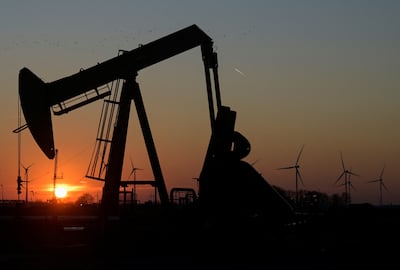Oil prices settled lower on Friday on supply concerns, but still managed to post a fourth consecutive weekly gain as the US imposed new sanctions on Russia’s energy industry amid the war with Ukraine.
Brent, the benchmark for two thirds of the world’s oil, closed 0.62 per cent lower at $80.79 a barrel. West Texas Intermediate, the gauge that tracks US crude, shed 1.02 per cent to settle at $77.88 a barrel.
Oil prices are on the rise “helped by a cold weather fanning demand, the fall in US inventories and multiple risks to shipments”, said Vijay Valecha, chief investment officer at Century Financial.
“In addition to the curbs against Russia, traders are concerned the incoming [Donald] Trump administration may both tighten sanctions against Iran and impose trade levies that disrupt oil flows or risk drawing retaliatory measures,” he added.
Last week, the US and UK toughened sanctions on Russia's energy industry, intensifying pressure on Moscow as the war in Ukraine nears its fourth year. The new measures, designed to hit Moscow's energy revenue that is fuelling its war machine, targets individuals and Russian entities including Gazprom Neft and Surgutneftegas, both major players in the Russian oil industry.
The measures also take aim at oil-carrying vessels – many of which are part of the “shadow fleet” engaged in the illegal trade of Russian oil – as well as Russia-based oilfield service providers, energy officials and “opaque traders”, according to a statement from the US Department of the Treasury.

Falling US oil stock and continued cold weather in the US and Europe is also supporting oil prices. For the week ending January 10, US commercial crude oil inventories decreases by 2 million barrels from the previous week, the latest data from the Energy Information Administration shows. At 412.7 million barrels, US crude oil inventories are about 6 per cent below the five-year average for this time of year.
Traders are also keeping a close eye on the incoming Trump administration and what polices it will institute in relation to Iran and trade. During his previous term in the White House, Mr Trump exerted maximum pressure on Iran to limit its energy exports and reduce revenue in response to its nuclear programme.
"Donald Trump’s tariff threats and plans to jolt the energy space with further sanctions against oil-producing countries like Iran, Russia and Venezuela threaten to maintain the upside pressure in oil prices this year," said Ipek Ozkardeskaya, senior analyst at Swissquote Bank.
"Although Trump explicitly wants to finish with the war in Ukraine, members of his new team say that they support further sanctions against Russian oil giants. On top, Trump will tighten his grip on Iran against its nuclear work and punish Venezuela for its anti-democratic turn."


